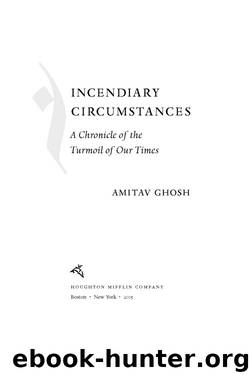Incendiary Circumstances by Amitav Ghosh

Author:Amitav Ghosh [Ghosh, Amitav]
Language: eng
Format: epub
Publisher: Houghton Mifflin Harcourt
Unfortunately, The Trench comes as a great disappointment. The narrative now moves away from Harran to a city in the interior called Mooran ("the Changeable"), which serves as the seat of the country's ruling dynasty. With the move to the capital, the focus of the narrative now shifts to the country's rulers.
The story of The Trench is common enough in the oil sheikdoms of the Arabian peninsula; it begins with the accession to power of a sultan by the name of Khazael, and it ends with his deposition, when he is removed from the throne by rival factions within the royal family. Munif describes the transformations that occur during Sultan Khazael's reign by following the career of one of his chief advisers, a doctor called Subhi al-Mahmilji (who earlier played an important part in the creation of the new Harran). The story has great potential, but Munif's voice does not prove equal to the demands of the narrative. It loses the note of wonder, of detached and reverential curiosity, that lent such magic to parts of Cities of Salt, while gaining neither the volume nor the richness of coloring that its material demands.
Instead Munif shifts to satire, and the change proves disastrous. He makes a valiant attempt—not for nothing are his books banned in various countries on the Arabian peninsula—but satire has no hope of success when directed against figures like Sultan Khazael and his family. No one, certainly no mere writer of fiction, could hope to satirize the royal families of the Arabian peninsula with a greater breadth of imagination than they do themselves. As countless newspaper reports can prove, factual accounts of their doings are well able to beggar the fictional imagination. Indeed, in the eyes of the world at large, Arab and non-Arab, the oil sheik scarcely exists except as a caricature; he is the late twentieth century's most potent symbol of decadence, hypocrisy, and corruption. He preempts the very possibility of satire. Of course, it isn't always so. The compulsions and the absurdities of an earlier generation of oil sheiks had their roots in a genuinely tragic history of predicament. But those very real dilemmas are reduced to caricature in Munif's Sultan Khazael.
Even where it is successful, moreover, Munif's satire is founded ultimately upon a kind of nostalgia, a romantic hearkening back to a pristine, unspoiled past. It is not merely Americans from the oil companies who are the intruders here: every "foreigner" is to some degree an interloper in Harran and Mooran. As a result, Munif is led to ignore those very elements of the history of the oil kingdoms that ought to inspire his curiosity, the extraordinary admixtures of cultures, peoples, and languages that have resulted from the Oil Encounter.
Workers from other parts of Asia hardly figure at all in Munif's story. When they do, it is either as stereotypes (a Pakistani doctor in Cities of Salt bears the name Muhammad Jinnah) or as faceless crowds, a massed symbol of chaos: "Once Harran had
Download
This site does not store any files on its server. We only index and link to content provided by other sites. Please contact the content providers to delete copyright contents if any and email us, we'll remove relevant links or contents immediately.
| Diaries & Journals | Essays |
| Letters | Speeches |
The Rules Do Not Apply by Ariel Levy(4969)
Bluets by Maggie Nelson(4556)
Too Much and Not the Mood by Durga Chew-Bose(4348)
Pre-Suasion: A Revolutionary Way to Influence and Persuade by Robert Cialdini(4232)
The Motorcycle Diaries by Ernesto Che Guevara(4098)
Walking by Henry David Thoreau(3962)
Schaum's Quick Guide to Writing Great Short Stories by Margaret Lucke(3381)
The Daily Stoic by Holiday Ryan & Hanselman Stephen(3321)
What If This Were Enough? by Heather Havrilesky(3311)
The Day I Stopped Drinking Milk by Sudha Murty(3197)
The Social Psychology of Inequality by Unknown(3031)
Why I Write by George Orwell(2953)
Letters From a Stoic by Seneca(2798)
A Short History of Nearly Everything by Bryson Bill(2698)
A Burst of Light by Audre Lorde(2607)
Insomniac City by Bill Hayes(2558)
Feel Free by Zadie Smith(2479)
Upstream by Mary Oliver(2390)
Miami by Joan Didion(2368)
